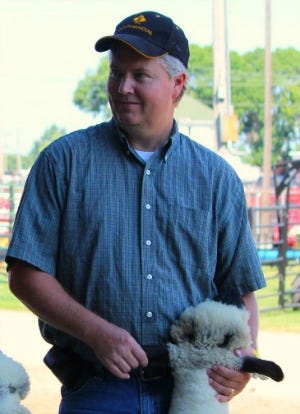
A truck with stock racks pulled up to the barn with a mother and son ready to load ewes that were bred to our ram this fall. As my husband opened the backdoor, I asked if he needed my help. He smirked and shut the door. It was rude, but a correct response. I just had surgery and was no help in the barn, and quite frankly, would not be for weeks to come. As I stood watching at the window, I started thinking of how farmers, especially livestock producers, have a job that does not have time for a sick day or even time to recover from a surgery.

GO-TO GUY: My husband, Stacy, handles the chores while I recover from surgery. However, he works all year round as seen here holding a lamb ringside.
Like many individuals post-surgery, I am on a few restrictions. First, I cannot lift objects heavier than 15 pounds. (I moved up from not lifting anything just two weeks ago.) Second, there is to be no sudden or jerking movements. Third, and to me the most difficult, I cannot drive for four weeks.
While these appear to be a mere annoyance, a bump in the road of life, these restrictions can affect our daily task of producing food for consumers.
I cannot think of many chores around the farm that do not include heavy lifting. At the rate I am going, it would mean multiple passes with the 5-gallon feed bucket to fill the feed bunk. Lifting a 50-pound bag of feed is not an option. Throwing square hay bales into the bunks is also out of the question.
Filling water tanks at our barn requires dragging a garden hose. Often, there is jerking to free it from a post just to get it into the water tank. So that task I cannot take on.
There are always sudden movements in the barn to get out of the way of an animal, or in my case, a mouse. So, I am left with only one option-don't visit the barn. This means, I cannot feed or water the animals.
Having your freedom taking away by not being able to drive is awful. I am fortunate that my livestock is right outside of my backdoor. When I can lift, jerk and make sudden movements, I will be able to walk outside and complete my chores. However, agriculture operations today often times require farmers to drive a truck to their livestock facilities, much like those individuals that commute to work in the city. Today, farmers winter animals on different pastures, or have feedlots no longer on their home place. For those farmers, attending to their animals may not be possible, without help.
I fear that too often consumers do not understand that in farming there is not time for a sick day, no time for recovery. And they probably never will. Why? Because agriculture is unique in the way that individuals rally to help one another in times of need. Neighbors seem eager to aid in doing chores-even if it is putting up Christmas lights. Children of farmers step up to feed and water despite school and extracurricular activities. But at our farm, with kids in college, it is my husband who comes to my agricultural aid --smirks and all.
About the Author(s)
You May Also Like






